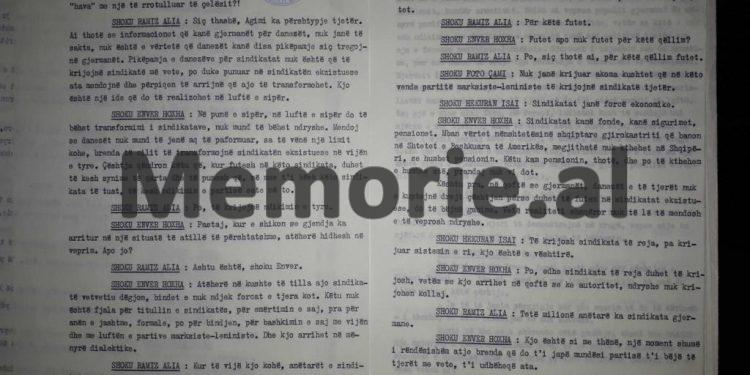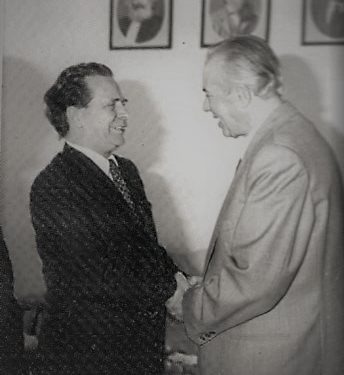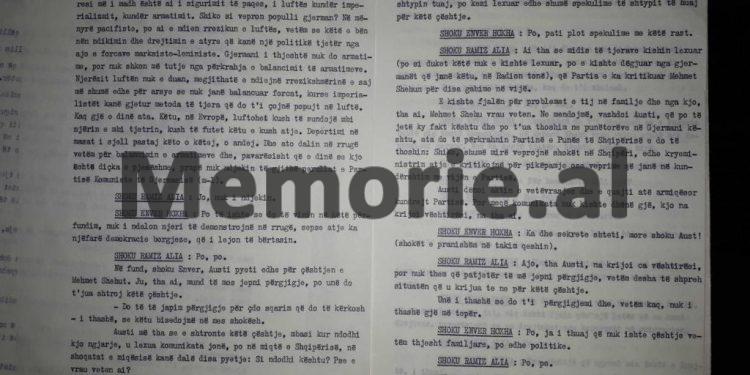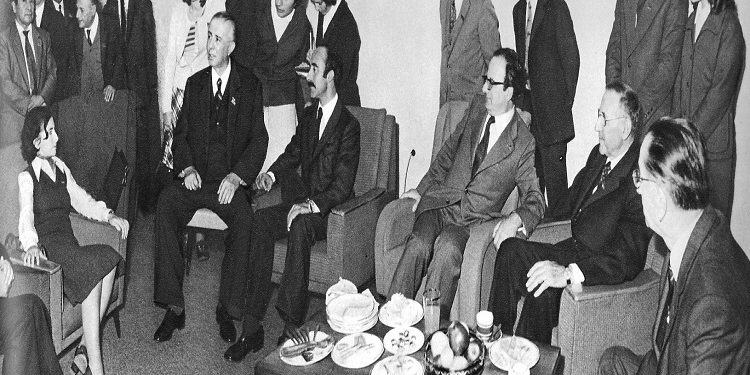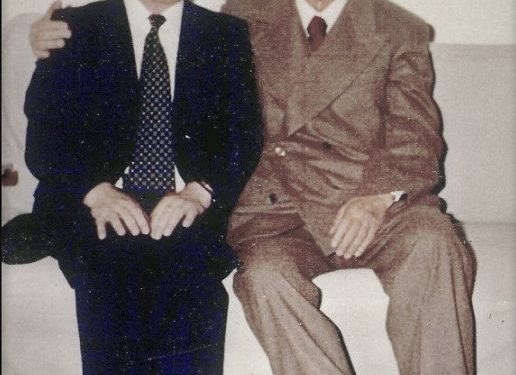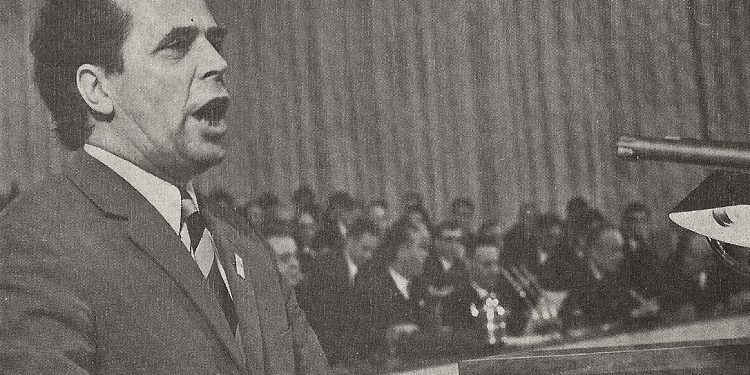Dashnor Kaloçi
Part four
Memorie.al/ publishes some archival documents extracted from the Central State Archive in Tirana (Fund of the former Central Committee of PPSh), which contain the acronym “Secret” and “Top Secret” and belong to a period from January from 1982 until September 1983, where there is a voluminous file with minutes of meetings of the Secretariat of the Central Committee and the Political Bureau of the Central Committee of the PPSh, meetings which were chaired by its General Secretary, Enver Hoxha, where they assisted: Ramiz Alia, Adil Çarçani, Manush Myftiu, Hekuran Isai, Rita Marko, Pali Miska, Hajredin Çeliku, Haki Toska, Simon Stefani, Lenka Çuko, Muho Asllani, Vangjel Çerrava, etc., as the main topic is analysis about the “hostile activity” of Mehmet Shehu and his close collaborators, from Fadil Paçrami, Todi Lubonja, Beqir Balluku, Petrit Dume, Hito Çako, Abdyl Këllezi, Koço Theodhosi, Kiço Ngjela, Vasil Kati, Kadri Hazbiu, Fiqret Shehu, Feçor Shehu, Mihalla q Ziçishti, Llambi Peçini, etc. In the file available to Memorie.al, in addition to the analysis of the “hostile activity of the police agent Mehmet Shehu and his associates Beqir Balluku and Kadri Hazbiu”, in the meetings of the Political Bureau and the daily meetings of the Secretariat of the PPS Central Committee, are analyzed also the activity of the Ministry of Internal Affairs and State Security, with its agency and collaborators, inside and outside the country, the reports and relations of the Albanian state with different countries of the world, such as: the USA, the Soviet Union, West Germany, England, Spain, Italy, as well as those with neighbors, such as Greece and Yugoslavia and the demonstrations in Kosovo, how the world press presented Socialist Albania, the talks with West Germany about the War reparations payments, meetings and conversations with party leaders Marxist-Leninists from different countries of the world, such as Ernst Aust, Zhoao Amazonas, Fosko Dinuçi, etc., regarding the “suicide of Mehmet Shehu”, the problems of Polish immigration Albanian refugees, in different countries of the world, and the change of the exchange rate of the dollar in the remittances, which they made to their relatives in Albania, up to numerous economic problems, from heavy industry, hydropower plants on the cascade of the river Drin, energy import and export, etc., etc.
Continues from last issue
The secret document with the minutes of the daily meeting of the secretaries of the PPSh Central Committee, held on May 15, 1982, regarding the meeting of Ramiz Ali with Ernst Aust, chairman of the Marxist-Leninist party of West Germany, and the country’s hydropower situation OUR
DAILY MEETING OF SECRETARIES OF THE CENTRAL PARTY COMMITTEE MAY 15, 1982
COMRADE RAMIZ ALIA: This, Austi said, created some difficulties for us, but I am not saying that you must give me an answer. I just wanted to express the situation that was created for us on this issue. I told him that we will answer him, that’s all and I didn’t say anything more.
COMRADE ENVER HOXHA: Yes, tell him that it was not only a family matter, but also a political one.
COMRADE RAMIZ ALIA: Yes, yes.
COMRADE ENVER HOXHA: It was an expression of a certain political attitude, against the Party line, that he connected affinity with a family that had many close people who fled to the United States of America, and that’s it. We criticized him for this mistake and he killed himself.
COMRADE RAMIZ ALIA: Yes.
COMRADE ENVER HOXHA: You, you talk about the connection of this affinity Austi has found out about these as they are well known. He did this trick, you mean, and it brought up a lot of other things. So for this matter, that’s all you will find out.
COMRADE RAMIZ ALIA: Yes, yes, that’s it.
COMRADE ENVER HOXHA: That is, you will point out that the truth is as the communique says, that Mehmet Shehu killed himself during a nervous depression. There is nothing else. So, so, good.
COMRADE RAMIZ ALIA: To me, it seems good in general.
COMRADE ENVER HOXHA: Did he say anything about the Kosovars?!
COMRADE RAMIZ ALIA: No, he did not speak.
COMRADE ENVER HOXHA: Does he protect the Kosovars?!
COMRADE RAMIZ ALIA: Comrade Enver protects them, he even wrote whole pages about them in the newspaper.
COMRADE HEKURAN ISAI: The German Marxist-Leninist comrades have also sent their representatives to the meetings held by the Kosovars.
COMRADE ENVER HOXHA: There are some things, you can tell Austin, that we cannot publish, such as a letter that they addressed to us, despite the fact that the Kosovars took it into exile.
COMRADE RAMIZ ALIA: Yes, yes.
COMRADE ENVER HOXHA: So the issue they raise, tell them that it is right. The Kosovars have addressed a letter to both our government and the Yugoslav government, the UN, etc., through which they request to return to their homeland.
If you ask, I will tell you in essence, why is it only the departure of Serbs and Montenegrins from Kosovo that is a problem, while for hundreds of thousands of Albanians, no one is interested?! Therefore, we cannot publish this letter.
COMRADE RAMIZ ALIA: Yes.
COMRADE ENVER HOXHA: Can you find someone in Germany to publish it, tell your German friends, since it is not known to the general public and is kept hidden from everyone?! There is nothing extraordinary here.
The newspaper can find out about its existence and content in many ways, since the Kosovars themselves have made and sent it.
COMRADE RAMIZ ALIA: The Kosovars themselves handed it over to us.
COMRADE ENVER HOXHA: So, they have made a petition.
COMRADE RAMIZ ALIA: They can send this petition to any foreign press for publication. There is nothing wrong with doing this. But its publication in our press is difficult, it complicates us.
COMRADE ENVER HOXHA: That’s right, it complicates us, although we are interested in it being published in the foreign press, as it becomes known to the public opinion.
COMRADE RAMIZ ALIA: That’s right.
COMRADE PHOTO ÇAMI: We can do something else with them, but the thing is that someone else will publish it first.
COMRADE ENVER HOXHA: The thing is to try to publish it in some newspaper, then everyone will take it and publish it.
COMRADE RAMIZ ALIA: Yes, then others take it, and we can also take it from them.
COMRADE ENVER HOXHA: Yes, we take it too.
COMRADE RAMIZ ALIA: If it is published in any press, we will publish it in the column “Foreign press on the events in Kosovo”.
COMRADE ENVER HOXHA: In it, it will not be mentioned that this letter was addressed to the government of Albania, but that it was addressed to other governments, that can be said.
COMRADE RAMIZ ALIA: Yes, it should be done that way.
COMRADE ENVER HOXHA: What can we say to the Germans about anything else?! We can talk to you about the letter we wrote to West Germany about the problem of diplomatic relations talks between our two countries, stressing that we are also informing our German friends about this issue.
COMRADE RAMIZ ALIA: Yes, I also talked to you a little bit about this issue yesterday.
COMRADE ENVER HOXHA: And tell them openly that the response of the West German governments is unacceptable to us. We were positively inclined towards the establishment of relations with the Federal Republic of Germany, but the way they solved the problem of reviewing pending cases, without mentioning reparations, is unacceptable to us and makes no sense.
What talks do the Germans want to have with us, whether in Paris, Belgrade, or Stockholm?! They do not specify this.
When we can establish diplomatic relations at the level of ambassadors, it is enough to set the deadline, agree on both sides, and announce the communique. We do it, as we did with Japan. The Japanese published the communiqué in Tokyo, while we in Tirana, and entered into diplomatic relations.
The same can be done with Germany. Therefore, what are the talks that the Germans told us to do in Paris?! What talks do they want to do?! If they want to negotiate what we say, then it’s different. But they don’t say that, and they expect us to tell you. And we tell you. But this work has no end either today or tomorrow.
COMRADE HEKURAN ISAI: They cut it now at the end.
COMRADE ENVER HOXHA: Our representative did not respond properly to the German who conducted a survey.
COMRADE RAMIZ ALIA: In fact, he did a survey.
COMRADE ENVER HOXHA: The survey was based on this, that if you don’t want to hold the talks in Paris, we’ll go to Belgrade, if you don’t want to Belgrade, then we’ll go to Stockholm, if you want.
But our representative should have told him that the problem does not lie in the choice of the country, but in the answer and clarification of those we will discuss about the establishment of relations.
For this, they did not answer us properly. That is, the German representative left the matter only to the choice of the country, according to our desire.
COMRADE HEKURAN ISAI: In the first phase, this issue was presented to us positively. It was discussed closely how it would happen. I don’t know with whom Musin Kroi was in talks, was he alone or with an interpreter?!
COMRADE ENVER HOXHA: No, no, he was with Engjëll Kolaneci.
COMRADE HEKURAN ISAI: Angel, it was now at the end. I know that he has not been with the Angel before.
COMRADE RAMIZ ALIA: In the beginning, when Engjëlli was not there, he was alone, but now at the end he was with him.
COMRADE HEKURAN ISAI: It depends, how does he understand German?!
COMRADE ENVER HOXHA: I don’t know, but the point is that the Germans are diplomats.
COMRADE RAMIZ ALIA: That’s right, it seems clear.
COMRADE ENVER HOXHA: I don’t remember well, but the German said two words to us, and our ambassador who died was a little stiff but also relaxed. So he released two adjectives for him. How did he put those two words?!
It also burdened him, because it was correct. On the other hand, I don’t know but……. Here, take the telegram. They are two opposite adjectives. When I read them, I immediately thought that they may or may not approve.
COMRADE RAMIZ ALIA: Yes, that’s right.
COMRADE ENVER HOXHA: I mean, let’s leave the issue, understand it however you want.
COMRADE RAMIZ ALIA: Yes, yes.
COMRADE ENVER HOXHA: Because he just said “Trust us”.
COMRADE RAMIZ ALIA: That’s what he said.
COMRADE ENVER HOXHA: We shouldn’t do this there, he said, but let’s leave it at that.
COMRADE RAMIZ ALIA: Take a closer look at what you discussed earlier.
COMRADE ENVER HOXHA: And when the German asked the last question to our representative, he again hinted that something will be done. This is how it turns out. Nesti Nase, study the telegram well and properly. That if he does not study it well, he cannot draw conclusions.
COMRADE HEKURAN ISAI: You didn’t study well, you take things out of context.
COMRADE ENVER HOXHA: That’s right, take them separately. Did Comrade Ernst Austi raise any other issues?! Will it go anywhere?!
COMRADE RAMIZ ALIA: Yes, yes, today he will go to Koman.
COMRADE ENVER HOXHA: We can talk a little with him, and about economic issues. The exchanges we are making with West Germany are still small, and I think they amount to 80 or 90 million dollars.
If possible, the German friend can express his opinion about the perspective and the possibility of these exchanges in the future, as well as in which direction we can be more favored with prices, with Federal Germany?!
That is, to tell us what we can sell in the first place in Germany, and then what to buy, what can Germany buy from us, and who can buy them?!
Which area of Germany can buy them?! That the economic reality of this country is different. There are different firms and requirements. For our articles, be they heavy industry, agriculture or handicrafts, we need to know where we can enter better and in what direction.
Then, let’s be interested in what we can buy from them. We plan to buy a lot of factories during this 5 year period, but the German prices are heavy.
However, about the quality of the facilities that we can buy in West Germany and their technology, in relation to those of other countries, we can get an opinion from the German friend, if he knows these problems.
COMRADE RAMIZ ALIA: Yes.
COMRADE ENVER HOXHA: On this occasion, we will see how these people support the work of the Party. That is, how do they evaluate the trends in the trusts or in the different factories?!
COMRADE RAMIZ ALIA: Yes, yes, in economic expansion. Memorie.al
The next issue follows





